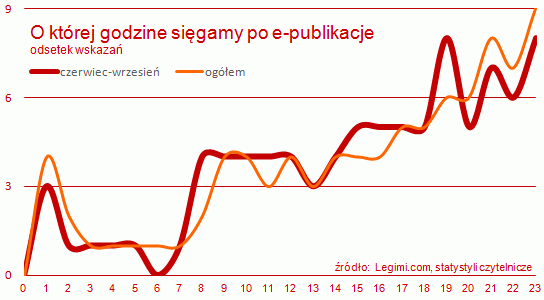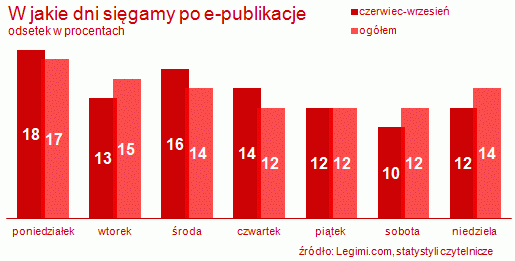
Summer shows a more evenly spread tendency to read digital publications throughout the day. However, evenings clearly dominate, especially late evenings, with a noticeably higher percentage of e-readers at the end of the day.
For Android devices, peak reading times during summer were at 2 p.m. (14% of respondents) and 9 p.m. (10%); iPad users read most around 8 a.m. and 4 p.m. (13% each), while iPhone e-book readers usually read at 9 p.m. (28%) and 1 p.m. (18%) - according to the study authors from Legimi. This indicates that smartphone users (both Android and iPhone) prefer reading during lunch and late in the evening.
Interestingly, according to analyses from the digital publications platform, e-reader owners are less predictable, reading at different times of day and night. 3% of respondents reported using their reader between 1 and 2 a.m., 5% at 9 a.m., 8% at 6 p.m., and 9% at 10 p.m. When combining results across all devices, peak reading times were in the late afternoon and evening (6 p.m. and 11 p.m. - 9% each).

One might think weekends are when we read the most. However, this isn’t true, as e-book and e-newspaper readers report otherwise. Summer weekends saw noticeably less reading than weekdays, with Monday, Tuesday, and Wednesday standing out. - This may be because popular weeklies, also available in digital editions, are released on those days - suggest the study authors.
Outside of the vacation period, Android phone or smartphone users typically read at the beginning of the week (32% on Monday, 23% on Tuesday, and only 2% on Sunday).
COMMERCIAL BREAK
New articles in section Media industry
Tags, hashtags and links in video descriptions. Youtube SEO after Gemini AI update [ANALYSIS]
BARD
Once, positioning a video on Youtube was simple. It was enough to stuff the description with keywords and wait for results. Those days are not coming back. In 2026, the algorithm is no longer a simple search engine that connects dots. It is the powerful Gemini AI artificial intelligence that understands your video better than you do.
Freelancers 2025 in media and advertising. Useme report
Krzysztof Fiedorek
The modern media and communication market presents entirely new challenges for independent creators. Traditional services are giving way to more complex forms of messaging. The most popular industries in which Polish freelancers operate focus on companies' online presence and visual content.
Video content in Poland. What and how we watch
Paweł Sobczak
Video content is watched remotely, but streaming services are mainly enjoyed in the comfort of home. This is how the consumption of audiovisual content by Poles in 2025 can be summarized. This is the result of an analysis of a study conducted by SW Research and data from the company MEGOGO.
See articles on a similar topic:
Review of media from around the world. See what they are buzzing about [LINK]
AUTOPROMOCJA Reporterzy.info
What is the media buzzing about? A review of the headlines of the most important newspapers and websites. Events of the day, country, world, media market, economy, sport, foreign media, and even gossip and curiosities. In real time and 24 hours a day. We invite you!
Artificial Intelligence in the Media. Reuters Digital News Report 2024
Krzysztof Fiedorek
AI has gained prominence in recent years, and its application in producing, distributing, and presenting news content continues to grow. However, this development is met with mixed feelings by audiences, which has significant consequences for media trust and its future.
Music for Overstimulated Children: Research from Polish Kindergartens
OOO
Hyperactivity, impatience, and difficulties with concentration are increasingly common challenges faced by preschool and school-aged children. An excess of stimuli, including digital ones, makes it hard for children to focus on a single task. Is there anything that can be done about it?
Artificial intelligence in newsrooms. Three realities of the AI era in media
Krzysztof Fiedorek
According to a report by the European Broadcasting Union, many newsrooms already use AI but still do not fully trust it. Audiences do not want "robotic" news, and the technologies themselves though fast can be costly, unreliable, and surprisingly human in their mistakes.





























